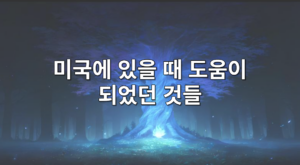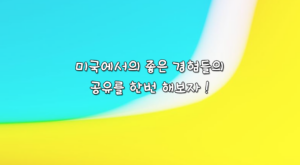the American Story info
미국에서 살면서 느꼈던 여러가지 이야기를 여기에 하나로 정리를 해서 여러분들에게 소개를 해드리려고 합니다 물론 ! 각자 다른 미국에 대한 생각들이 있겠지만 제 American Story는 그냥 재미로 보는 것이지 비교를 하시면서 뭐가 맞다 틀리다 이렇게 이야기를 하지 않으셨으면 좋겠습니다
어떤 목적으로 만들어 졌을까요 ?
구체적인 목적들은 없습니다 단지 제 경험들을 토대로 공유를 하다보면 좋은 내용들이 나오지 않을까 하는 기대감으로 만들었으며 단순히 정보 공유에 목적이 있습니다
어떤 목표?
핵심으로 저희가 보는 목표라는 것은 여러분들이 미국에 대한 이야기와 그리고 각자 사는 곳에 대한 차이점을 이해를 하다보면 내 삶의 조금더 풍족한 이야기를 담을 수 있지 않을까 ? 생각을 하면서 운영을 해보려고 합니다 의견과 피드백은 언제나 환영 입니다
왜 미국 이야기인가?
미국이라는 나라를 옛날부터 좋아 하였고 동경 했습니다 누구나 가보고 싶은 나라라고 다들 이야기도 하였고 저 또한 공감이 굉장히 크게 되었죠 하지만 궁극적으로 사람들이 아직 정확하게 모르는 미국 이야기들이 상당히 많이 있습니다 음식 ,문화 , 개성 등등..
어떤 결과를 얻을수 있나?
우선 미국에서 생활권에 들어가 있는 분들에 대한 인터뷰를 진행을 하면서 꿀팁들을 공유를 하려고 합니다 한 두가지로 제한을 하면 안되겠죠? 적어도 10가지는 제가 쭈욱 적어서 공유를 하려고 합니다
어디서 자료를 가지고오나요?
주로 한인분들에게 물어보거나 제 경험을 토대로 이야기를 하는 경우가 대다수 입니다 자료를 가지고 오는 경우는 없습니다 다만 아직 알려지지 않는 내용들을 추가해서 전달을 하는 경우도 있으니 이 점은 제가 따로 기재를 해놓도록 하겠습니다
어떻게 연락을 하나요?
저희는 오프라인으로는 연락을 받지 않고 있습니다 대부분 온라인으로만 이야기를 전달을 받고 있는데요 어떤 구체적인 사연과 함께 이메일로 첨부해주시면 검토 해드리겠습니다
언제까지 하시나요?
1주일에 약 4회 정도를 업로드를 목표를 하고 있으며 주말에는 쉬고 있습니다 그리고 제한사항이 없는한 계속해서 운영을 할 예정입니다
궁금한점은 어떻게 물어보나요?
따로 모든 분들에게 이런 개인적으로 궁금하신 분들이 계시고 문의를 주시는 분들이 많이 있지만 저희가 궁금한 내용들을 정리를 하기만 하고 따로 문의를 받지는 않습니다
현재 트렌드도 알려주나요?
네 다양하게 알려드립니다 미국에서 지금 이슈가 되고 있는 또는 화두가 되고 있는 모든 정보들을 정리를 해서 말씀 드리려고 합니다 영어말고 한국어로 말씀을 드리는점 양해를 부탁드립니다
알리익스프레스 같은 플랫폼들은 미국 말고 국내에만 통한다
미국에서는 알리익스프레스를 이용을 하시는 분들이 많이 계실까요? 저는 그렇지 않다고 생각을 합니다 국내에서만 먹히는 것이 사실이죠 이 처럼 알리익스프레스 프로모션에 대해서 항상 찾아보는 사람들은 한국이 아마 유일한 것으로 저는 알고 있을 겁니다 그래도 맛보기로 이용을 해보신다면 저는 적극적으로 권유를 드릴겁니다
미국에서의 먹거리 고민
최근에 제가 이야기를 드렸지만 미국에서 먹거리 때문에 참 많은 고민을 하게 되었습니다 먹을 것도 많고 다양한데 제 입맛에 맞지 않는 경우가 있지요 그래서 얼마 전에 한국에 들어가서 미트리 할인코드를 통해서 여러 한국식 먹거리를 사왔습니다 흑미밥,현미밥,미역국 등등.. 어쩌면 저는 계속해서 이렇게 왕래를 해야될지 않을까 생각이 드네요
미국과 한국에서도 의류가 곧 개성이다
예전보다 달라진 이런 의류에 대한 문화를 눈치를 채신 분들은 거의 없을 겁니다 대표적으로 하나를 말씀을 드리자면 지금 내 자신을 얼마나 효과적으로 멋있게 보일 수 있는 것인지 이게 중요한 시대가 되었는데요 그 중심에는 바로 의류와 개성이 있는 것이죠 그리고 그런 의류 관련 플랫폼에는 KREAM이 있습니다 MZ세대들이 많이 이용을 하는 KREAM 추천인 코드를 알아보셔서 의류에 대한 흐름을 체크해보세요
미국에 있을 때 도움이 되는 것들
저도 마찬가지로 국내에서 미국으로 가는 빈도수가 엄청나게 많아졌습니다 거의 3배 이상 늘었죠 그런데 가장 힘이 많이 드는 것은 체력적인 부분인데요 나이가 들어서 어쩔수가 없지만 충분히 관심을 가지고 개선이 가능합니다 여러가지가 있지만 영양제가 가장 도움이 되었습니다 처음에는 아이허브 할인코드 입력을 통해서 배웠었고 지금은 익숙해져서 자주 영양제를 들고 가고 있습니다




